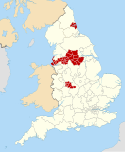|
Bury Metropolitan Borough Council
Bury Metropolitan Borough Council, also known as Bury Council, is the local authority of the Metropolitan Borough of Bury in Greater Manchester, England. It is a metropolitan borough council and provides the majority of local government services in the borough. The council has been a member of the Greater Manchester Combined Authority since 2011. The council has been under Labour majority control since 2011. It is based at Bury Town Hall. HistoryThe town of Bury had been governed by improvement commissioners from 1846. They were replaced in 1876 when the town was incorporated as a municipal borough, after which it was governed by a body formally called the 'mayor, aldermen and burgesses of the borough of Bury', generally known as the corporation, town council or borough council.[3] When elected county councils were established in 1889, Bury was considered large enough to provide its own county-level services, and so it became a county borough, independent from the new Lancashire County Council, whilst remaining part of the geographical county of Lancashire.[4] The larger Metropolitan Borough of Bury and its council were created in 1974 under the Local Government Act 1972 as one of ten metropolitan districts within the new metropolitan county of Greater Manchester. The first election was held in 1973. For its first year the council acted as a shadow authority alongside the area's six outgoing authorities, being the borough councils of Bury, Prestwich and Radcliffe, and the urban district councils of Ramsbottom, Tottington and Whitefield. The new metropolitan district and its council formally came into being on 1 April 1974, at which point the old districts and their councils were abolished.[5] The metropolitan district was awarded borough status from its creation, allowing the chair of the council to take the title of mayor, continuing Bury's series of mayors dating back to 1876.[6] The council styles itself Bury Council rather than its full formal name of Bolton Metropolitan Borough Council.[7] From 1974 until 1986 the council was a lower-tier authority, with upper-tier functions provided by the Greater Manchester County Council. The county council was abolished in 1986 and its functions passed to Greater Manchester's ten borough councils, including Bury, with some services provided through joint committees.[8] Since 2011 the council has been a member of the Greater Manchester Combined Authority, which has been led by the directly elected Mayor of Greater Manchester since 2017. The combined authority provides strategic leadership and co-ordination for certain functions across Greater Manchester, notably regarding transport and town planning, but Bury Council continues to be responsible for most local government functions.[9][10] GovernanceBury Council provides metropolitan borough services. Some strategic functions in the area are provided by the Greater Manchester Combined Authority; the leader of Bury Council sits on the combined authority as Bury's representative.[11] There are no civil parishes in the borough; the whole area is unparished.[12] Political controlThe council has been under Labour majority control since 2011. Political control of the council since the 1974 reforms took effect has been as follows:[13][14]
LeadershipThe role of mayor is largely ceremonial in Bury. Political leadership is instead provided by the leader of the council. The leaders since 2002 have been:[15]
CompositionFollowing the 2024 election, the composition of the council was:[16]
The next election is due in May 2026. ElectionsSince the last boundary changes in 2022, the council has comprised 51 councillors representing 17 wards, with each ward electing three councillors. Elections are held three years out of every four, with a third of the council (one councillor for each ward) elected each time for a four-year term of office.[17] Wards and councillorsEach ward is represented by three councillors.[18]  1 Ramsbottom 2 North Manor 3 Tottington 4 Elton 5 Moorside 6 Bury West 7 Bury East 8 Redvales 9 Radcliffe North & Ainsworth 10 Radcliffe East 11 Radcliffe West 12 Unsworth 13 Pilkington Park 14 Besses 15 St. Mary's 16 Holyrood 17 Sedgley
PremisesThe council is based at the Town Hall on Knowsley Street in Bury. The building was officially opened in 1954 for the old Bury Borough Council; construction had begun fifteen years earlier but had been interrupted by the Second World War.[19] In 2023 the council announced plans to refurbish the building, allowing the council to consolidate its other offices into the Town Hall, notably from Knowsley Place opposite.[20] References
External links |
|||||||||||||||||||||||||||||||||||||||||||||||||||||||||||||||||||||||||||||||||||||||||||||||||||||||||||||||||||||||||||||||||||||||||||||||||||||||||||||||||||||||||||||||||||||||||||||||||||||||||||||||||||||||||||||||||||||||||||||||||||||||||||||||||||||||||||||||||||||||||||||||||||||||||||||||||||||||||||||||||||||||||||||||||||||||||||||||||||||||||||||




